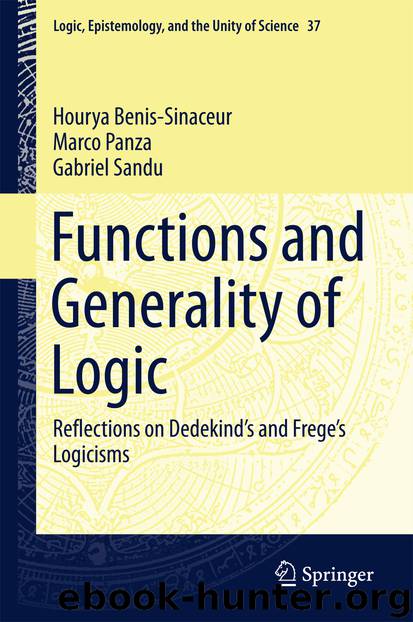Functions and Generality of Logic by Hourya Benis-Sinaceur Marco Panza & Gabriel Sandu

Author:Hourya Benis-Sinaceur, Marco Panza & Gabriel Sandu
Language: eng
Format: epub
Publisher: Springer International Publishing, Cham
109This is the essential reason why Frege does not have the notion of logical consequence, let us say from a set S of logical formulas to a logical formula A. He does not consider a formula under a range of interpretations.
110Cf., e.g., [74], Chap. 2, “Frege and the paradox of analysis”, pp. 17–52. Note in passing that Frege does not use the adjective ‘explicit’ to qualify explicit definitions (since, for him, any suitable definition is explicit).
111Cf. footnote (112), below.
112That’s the paradox of (logical) analysis, which results from an immediate insight and yields an axiom instead of giving an identity each member of which is a logical object. Regarding worries caused by the expression ‘ zerlegende Definition’, and its relations with “analytische Wahrheiten” and “analytische Grundsätzen”, which Frege deals with in Grundlagen ([93], Sects. 3–4)—where we do not find ‘analytische Definition’, but rather ‘Auflösung der Begriffe’, for ‘conceptual analysis’—, cf. [73], Chap. 2. Dummett renders ‘zerlegende Definition’ with ‘analytic definition’, in according with the translation of [107]. But, as rightly observed by Beaney ([6], p. 316, footnote 10), Frege’s zerlegende Definitionen are not analytisch in the Kantian sense. According to Beaney (ibid.), “where a definition is ‘analytic’, then it must be understood as either a ‘constructive definition’ or an ‘axiom’ ” (I suppose that he takes constructive definitions to include the definition of individual cardinal numbers in Grundlagen and Grundgesetze). But if “analytic” definitions may be “axioms”, the task remains to explain why Frege continues, as late as in 1914, to reject axioms as (implicit) definitions. After all, following Frege’s terminology, there are not only “logical concepts” and “logical objects”, but also “basic laws”, which might be taken as logical axioms.
Download
This site does not store any files on its server. We only index and link to content provided by other sites. Please contact the content providers to delete copyright contents if any and email us, we'll remove relevant links or contents immediately.
| Anthropology | Archaeology |
| Philosophy | Politics & Government |
| Social Sciences | Sociology |
| Women's Studies |
The remains of the day by Kazuo Ishiguro(8968)
Tools of Titans by Timothy Ferriss(8363)
Giovanni's Room by James Baldwin(7320)
The Black Swan by Nassim Nicholas Taleb(7104)
Inner Engineering: A Yogi's Guide to Joy by Sadhguru(6785)
The Way of Zen by Alan W. Watts(6595)
Asking the Right Questions: A Guide to Critical Thinking by M. Neil Browne & Stuart M. Keeley(5755)
The Power of Now: A Guide to Spiritual Enlightenment by Eckhart Tolle(5745)
The Six Wives Of Henry VIII (WOMEN IN HISTORY) by Fraser Antonia(5496)
Astrophysics for People in a Hurry by Neil DeGrasse Tyson(5174)
Housekeeping by Marilynne Robinson(4434)
12 Rules for Life by Jordan B. Peterson(4299)
Double Down (Diary of a Wimpy Kid Book 11) by Jeff Kinney(4257)
The Ethical Slut by Janet W. Hardy(4241)
Ikigai by Héctor García & Francesc Miralles(4238)
Skin in the Game by Nassim Nicholas Taleb(4235)
The Art of Happiness by The Dalai Lama(4120)
Skin in the Game: Hidden Asymmetries in Daily Life by Nassim Nicholas Taleb(3987)
Walking by Henry David Thoreau(3950)
